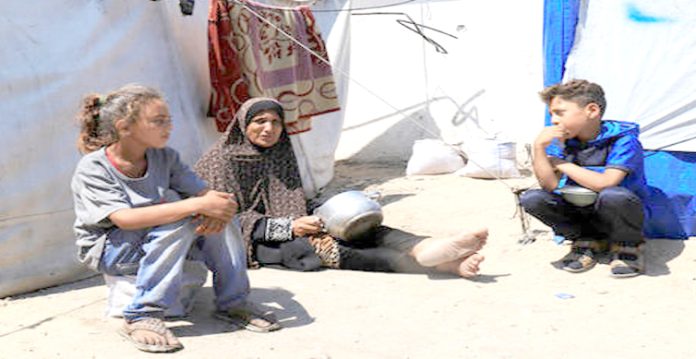The people of Gaza marked Eid Al-Adha on Thursday not with feasts and festivities, but with heartbreak, hunger, and makeshift prayers. With fresh meat nearly impossible to find and basic food supplies dwindling, what is typically a joyful religious celebration turned into another day of survival under siege.
For the second year in a row, Palestinians in Gaza are observing both major Islamic festivals — Eid Al-Adha and Eid Al-Fitr — under the shadow of war and extreme deprivation. The war that began in October 2023 has shattered lives, leveled homes, and starved communities.
Traditionally, Eid Al-Adha is celebrated with the sacrifice of sheep or cattle, symbolizing the Prophet Ibrahim’s devotion to God. Families gather for hearty meals and children receive gifts. But this year, no fresh meat has entered Gaza for more than three months. Most of Gaza’s livestock — 96% of animals and 99% of poultry — have perished due to Israeli bombardments and ongoing blockades, according to the UN.
Also Read: Trump’s Gaza Relocation Proposal Sparks Outrage
In Muwasi, a coastal tent camp, a few animals were displayed for sale. A cow, a camel, and some sheep attracted curious onlookers, mostly children. But no one could afford to buy.
“I can’t even buy bread. No meat, no vegetables. The prices are astronomical,” said Abdel Rahman Madi, a resident of the camp.
Even in the Khan Younis market, where stallholders sold second-hand clothes and toy sheep, most people left empty-handed. Hala Abu Nqeira, a mother shopping for her children, said, “Before, there was Eid atmosphere, the children were happy. Now there’s no flour, no clothes, no joy.”
Israel’s blockade, aimed at pressuring Hamas to release hostages, cut off food and humanitarian aid for over two months. While some aid trucks have recently entered Gaza under UN coordination, the supplies mostly consist of flour — not enough to meet the basic nutritional needs of over 2 million displaced residents. The UN has also reported difficulty distributing aid due to looting and military restrictions.
A recent UN Food and Agriculture Organization survey found that 95% of Gaza’s cropland is either destroyed or unreachable due to Israeli military activity. This has left Gaza almost entirely dependent on humanitarian aid, which remains unreliable.
For mothers like Rasha Abu Souleyma, celebrating Eid means salvaging what little they can. She returned to her damaged home in Rafah to collect old belongings. Among them were plastic sunglasses and bracelets, which she gave her daughters as Eid gifts. “I can’t buy them clothes or meat,” she said. “I can’t even feed them bread.”
Nearby, children played on makeshift swings made of rope. Despite the devastation, their laughter echoed softly — a reminder of life’s fragile resilience.
Karima Nejelli, displaced from Rafah, summed up the collective pain: “During these four Eids, we as Palestinians saw no joy — no sacrifice, no cookies, no Eid clothes. Nothing.”
(This story is sourced from a third-party syndicated feed. Raavi Media takes no responsibility or liability of any nature. Raavi Media management/ythisnews.com can alter or delete the content without notice for any reason.)


